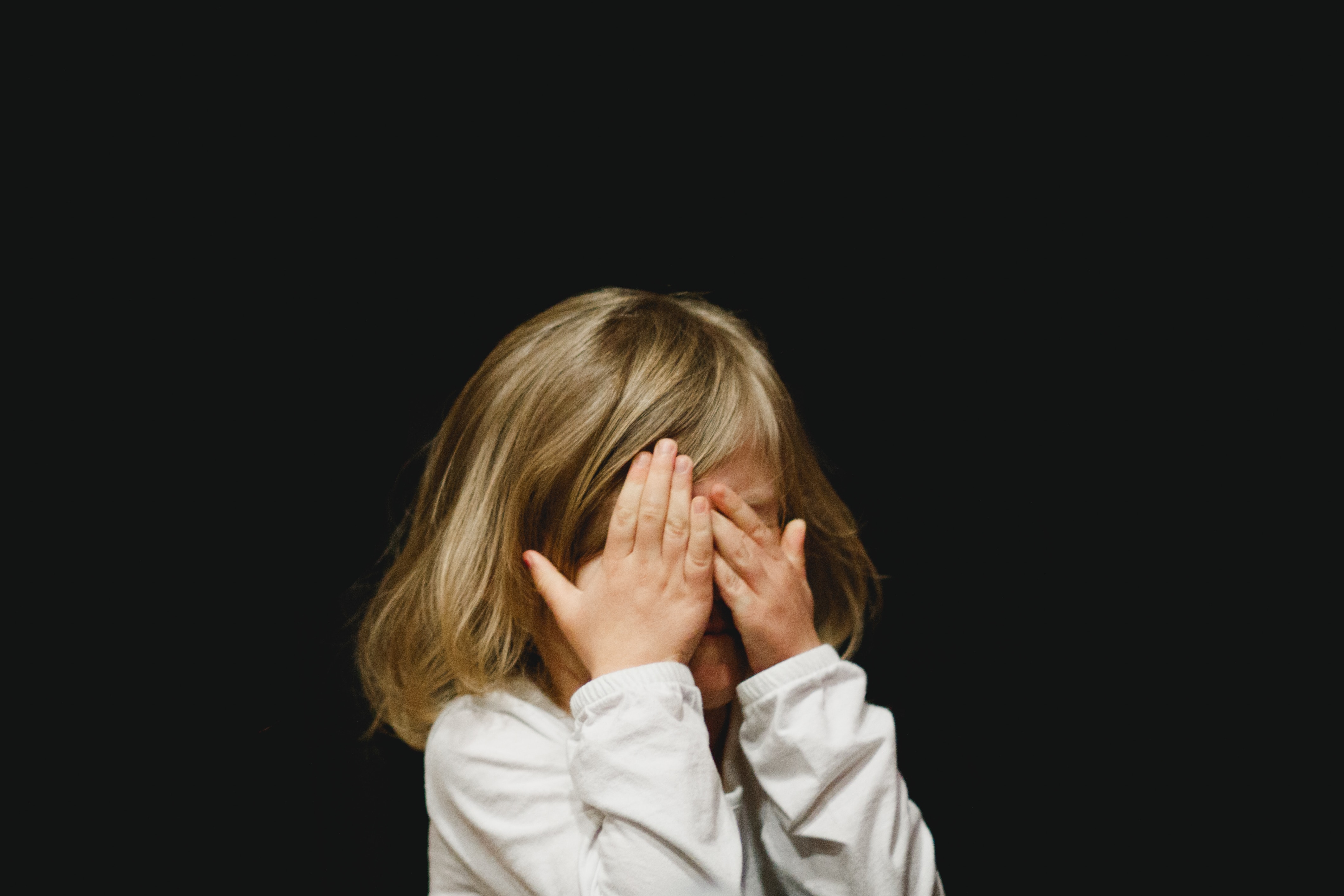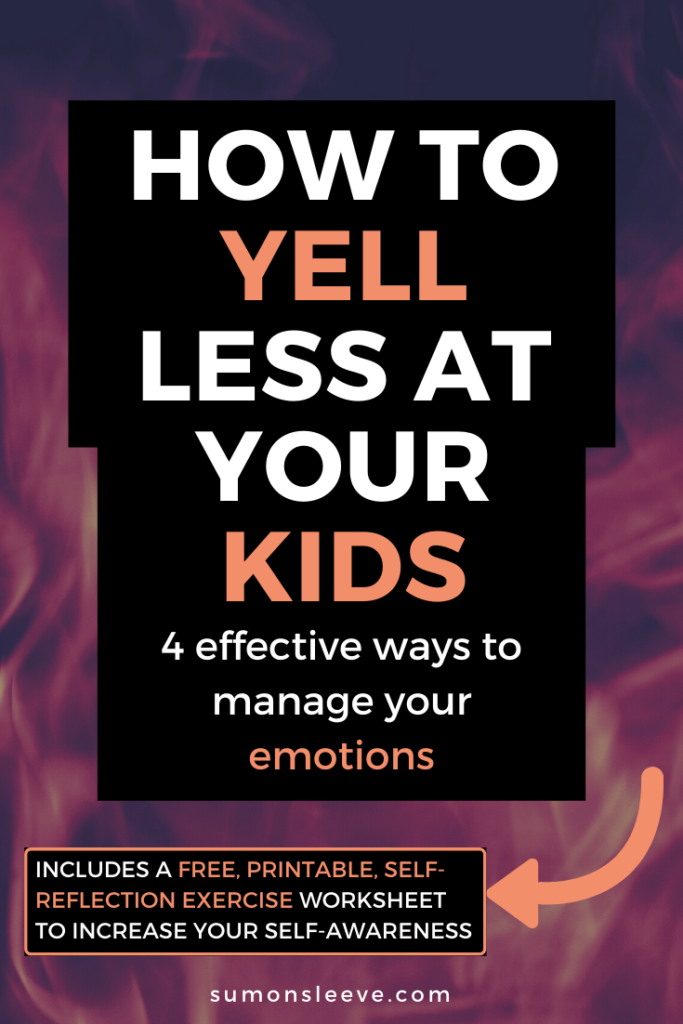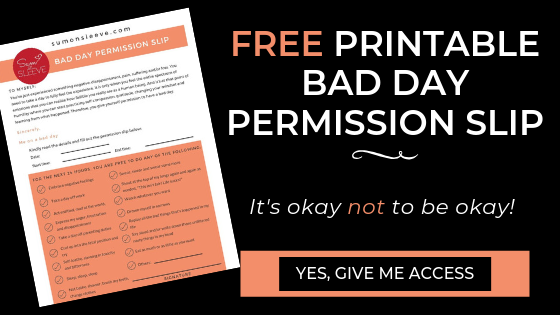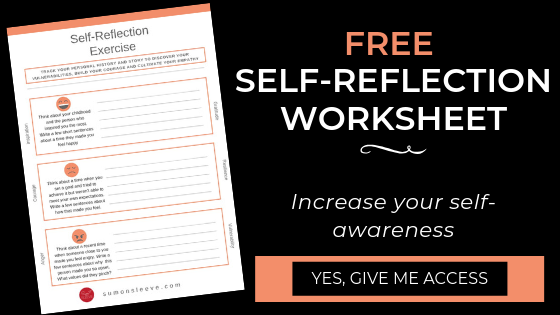“We’ve all yelled at our kids. It’s inevitable. I call your bluff if you say you haven’t.”

“I can’t help it. It just happens, especially when I’m exhausted at the end of the day.”
“I yell when I’m tired. I shout when I’m angry. I scream when I’m stressed. I know it’s not a good thing for them to always see me like this.”
“I feel so guilty afterwards.”
‘Less yelling’ versus ‘stop yelling’
I deliberately chose to name this blog post, “4 Ways To Yell Less At Your Kids” because I don’t think it’s actually possible to not yell at them.
While researching for this post, there were tons of blogs that provided tips on how to stop yelling at your kids.
Yeah, in a perfect world, parents would always be chill, in a good mood, and are mindful caregivers who provide utopian-like environments to nurture their children.
However, that sets a ridiculously high expectation for parents to meet, especially for struggling moms who are already trying to appear like they have it all together on social media.
“You’re telling me I can’t yell at my kid when he runs off in the mall, about to get trampled by hundreds of frantic holiday shoppers?”
Also, imagine growing up in a household where there was no yelling, no raised voices, no emotionally heightened situations. And you never witnessed your parents losing it, asking for forgiveness and forgiving themselves.
What does that teach a child?
Behaving perfectly is important in relationships. Emotional outbursts are unhealthy and unnatural.
Children need to learn how to express their feelings, to practice compassion for others and for themselves during difficult times and observing their parents demonstrate this is crucial in their emotional and social development.
When yelling becomes harmful
So yes, it’s okay to yell at our kids. However, it doesn’t mean we should all head to Costco, stocking up on throat lozenges and go all out with our vocal cords.
Studies have shown that shouting is an ineffective way to discipline children, can damage their brains and be just as harmful as hitting them.
It really depends on the frequency and context of the yelling.
Frequency
Does it seem like yelling is the only way to communicate with your kids? That they won’t listen unless your voice is raised?
Do you yell whenever you want them to do something or to stop doing something?
Is yelling your only tool to discipline your kid?
The more you yell, the less effective it is. Children become desensitized. Watch their faces and body language when you’re yelling.
Are they reacting or tuning you out?
Context
In what situations are you yelling?
Do you feel guilty afterwards? Like you’re a bad person who just kicked the dog?
Context matters when it comes to yelling.
Does the issue need to be communicated with a sense of urgency?
Do you need them to pay attention immediately?
Do you literally need to be loud because they physically can’t hear you?
There have been times when I yelled at my daughter and didn’t feel an ounce of guilt.
“STOP! DON’T TOUCH THE ELECTRICAL OUTLET!”
“YOU NEED TO HOLD MY HAND NOW!” (When we’re about to cross a busy intersection and she’s trying to shake my hand off)
“YOUR BREAKFAST IS READY! COME DOWNSTAIRS!” (When I’ve told her twice already)
“WHAT ARE YOU DOING UPSTAIRS?” (After hearing a loud bang)
“DON’T COME HERE!” (As I open the oven door to take the muffins out)
Then there were the guilty times.
When yelling is coupled with name-calling (“Stop being such a brat.”), criticism (“You’re lazy and useless.”) and/or negative intent (“What’s wrong with you? You can’t even do this simple thing.”) is when we feel the guilt.
Last year, my mental and emotional health was at an all-time low because I was trying to excel at everything, my full-time job, my mom duties, this blog, my marriage etc.
My perfectionism came back and every time I didn’t meet my own expectations, I got really upset with myself and took it out on the people close to me.
I would come home from work and complain and complain and complain. I was full of negative energy. I wasn’t myself.
One night, my daughter wouldn’t go to bed. She kept crying and screaming every time we tried to get her to sleep.
I yelled at her,
“Shut up! Shut up! Shut up! You’re so annoying. I don’t need this right now! You’re stressing me out. Just go to sleep!”
She stared at me in fear with her red, puffy eyes, threw herself down on the floor, crying even louder, squirming, pounding her little legs on the ground.
Then, unable to hold my composure, I did the same. I threw myself on the ground; tears flooded my tired, sullen face as I curled up beside her like a little child.
I was ashamed. I felt guilty. She was confused. This was my breaking point.
It was during this moment when I realized I needed to take care of myself and came up with these ways to manage my frustrations so I don’t take it out on her.
1. Ask yourself, is this about you or your child’s behaviour?
Often we lose our temper with our little ones is because we are broken internally. We are burnt out. We are overstressed. Our tolerance has become paper-thin.
As parents, our kids constantly test our limits, nagging, asking, demanding with tears, screams, tantrums, physical outbursts. They’re unreasonable and irrational because they’re demons children.
And we are expected to be the selfless grown-up, remaining calm, unflappable, absorbing, unconditionally giving. Add the stresses of life (health, finances, job, family, relationships etc.) and it’s hard not to take it out on our kids.
When we continuously give without replenishment is when we start to resent.
We resent our children because they don’t understand how to show appreciation yet, to show us gratitude in a way that means something to us. They are in their own little worlds and we are their servants. Servants deteriorate. Servants get broken. Servants rebel.
So we yell.
Then the guilt consumes us because we don’t want to yell at our kids; our intention isn’t to emotionally scar them with our loud voices.
We don’t want to abuse our power, our dominance, our size, our authority to get what we need from them.
But we do.
How can we stop this cycle of yelling, guilt, give give give, breaking points, and resentment?
By prioritizing ourselves, being proactive and self-aware when our needs aren’t being met and replenishing our mind, body and soul before the giving well runs dry.
“What’s going on with me this week?”
“Is my child’s behaviour the only thing I am currently upset with or is there more to it?“
“Am I emotionally depleted? How appreciated am I feeling on a scale of 1-10?”
“What can I do for myself to recharge? Who can I ask to help me?”
2. Visualize how it could go the next time
I actually got this exercise while reading Stephen R. Covey’s “7 Habits of Highly Effective People.”
The science behind visualization shows that when we imagine performing an act, our brains interpret those images as though we are physically doing it in real-life. Consequently, it creates a new neural pathway that trains our body to behave similarly if/when we actually perform the act.
Take a moment when you’re by yourself to visualize a situation where you’re about to lose your cool with your kid.
Think of your most common trigger:
Dawdling when you’re late, making a mess in the living room and not cleaning it up, talking back, not wanting to leave the store, interrupting you etc.
Imagine the conversation:
The back and forth between you and your child, the tone, pitch, speed of both your voices, what your body is doing (maybe your neck heats up or your hands start to shake or your jaw clenches), how their body is reacting.
Feel those feelings:
Angst, uneasiness, anxiety, frustration, annoyance, and/or rage so that it mimics real life.
The minute when you’re about to raise your voice, pause the situation as though you have a remote control in your hand.
Or for us 90’s kids, how Zack Morris from Saved By The Bell did his Time Outs.
Ideally, how would you want the situation to be resolved?
Remember you cannot control other people’s actions but you can control how you respond to them and how you process those emotions internally.
What would you say? How would you say it?
What would you do? What are some things you can to do to calm yourself down without raising your voice?
Every child is different and not all types of discipline work.
Think of a time when you were able to get through to your child without yelling, what worked for them?
Offering warnings, removing privileges, positive reinforcement etc.
Go through this mental exercise as frequently as possible so that it strengthens the new neural pathway in your brain to react similarly when the situation arises.
3. Try this 4-7-8 Breathing Technique
I’ve mentioned this breathing technique before in my “5 Natural Ways To Fall Asleep When You Have Momsomnia” blog post.
The 4-7-8 breathing technique was developed by Dr. Andrew Weil and personally, I’ve used it more often than I thought I would. It really works for me.
This exercise aims to bring you into a deep relaxation state by making you focus on your breath, increasing oxygen to your body and slowing down your heart rate.
How to do this:
- Take 4 seconds to breathe in through your nose.
- Hold your breath for 7 seconds.
- Take 8 seconds to breathe out through your mouth.
- Repeat
Here’s a video of me doing the 4-7-8 breathing technique:
When you sense you’re about to lose control and yell at your kid, you can go through this breathing technique to calm down.
4. Leave the situation temporarily
Physically leave
Sometimes, you can physically leave your kid by themselves to express your anger elsewhere before returning to manage the situation in a more controlled manner.
If you’re at home, you can go into another room, the garage, the attic, the car outside, the stairwell in apartment buildings, patio etc.
Personally, yelling and punching into a pillow or shouting inside your car with the doors and windows closed while banging the steering wheel can be pretty cathartic.
It depends on the age of the kid.
With babies and toddlers, make sure they’re in a safe environment where they can be left alone for a few minutes.
With older kids, let them know you’re leaving and that you’ll be back.
If you’re in a public place, this gets a little tough, especially if you’re by yourself and you can’t just leave them (legal and moral reasons).
When they’re small enough, you can pick them up and go somewhere private to decompress.
If you’re driving, it’s best to pull over and deal with the situation with your undivided attention.
Get others to help you
If your partner is around, loop them into what’s going on, discuss how you both want to discipline and depending on who is more emotionally stable at the moment, they would carry out the plan.
If your partner isn’t around, you can call a trusted non-judgy neighbour, your mom, your dad, a family member or a friend who lives close by to watch your kids while you go out for a walk or run errands.
Mentally check-out
If leaving isn’t an option and if there’s no one to help, that’s when you need to mentally check-out.
Let your body take over your mind, similar to a zombie movie where you’re physically there but you’re mentally elsewhere.
Basically, you’re trying to simulate an out-of-body experience where you’re observing what’s happening around you like you’re watching a movie. It’s temporarily dissociating yourself from your urge to explode in rage.
Another way to mentally check-out is to distract yourself with other activities.
Go load the dishwasher, watch a cat video, do the laundry, put some music on, rearrange the cushions…basically something you can physically do to get your mind off things before returning to your child.
Follow-through with consequences
Whether you physically or mentally leave, the most important thing is to come back, discuss with your child why their behaviour was inappropriate and discipline them accordingly.
It shows that even if you don’t respond immediately, you are consistent in following through with the consequences of their actions.
So Readers, how often do you yell at your kids? What are some tips or strategies that you use to yell less?






